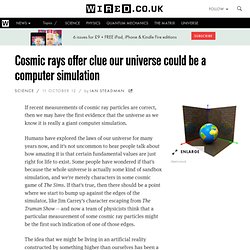

Smic rays offer clue our universe could be a computer simulation. If recent measurements of cosmic ray particles are correct, then we may have the first evidence that the universe as we know it is really a giant computer simulation.

Humans have explored the laws of our universe for many years now, and it's not uncommon to hear people talk about how amazing it is that certain fundamental values are just right for life to exist. Some people have wondered if that's because the whole universe is actually some kind of sandbox simulation, and we're merely characters in some cosmic game of The Sims. If that's true, then there should be a point where we start to bump up against the edges of the simulator, like Jim Carrey's character escaping from The Truman Show -- and now a team of physicists think that a particular measurement of some cosmic ray particles might be the first such indication of one of those edges.
If such an investigation does look consistent with a simulator lattice, then that could mean several things. Frankly, we don't know yet. Cosmos may be 'inherently unstable' 19 February 2013Last updated at 03:41 ET By Jonathan Amos Science correspondent, BBC News, Boston Collisions at the LHC in Geneva have refined a mass for the Higgs-like particle Scientists say they may be able to determine the eventual fate of the cosmos as they probe the properties of the Higgs boson.

A concept known as vacuum instability could result, billions of years from now, in a new universe opening up in the present one and replacing it. It all depends on some precise numbers related to the Higgs that researchers are currently trying to pin down. A "Higgs-like" particle was first seen at the Large Hadron Collider last year. Associated with an energy field that pervades all space, the boson helps explain the existence of mass in the cosmos. Since detecting the particle in their accelerator experiments, researchers at the Geneva lab and at related institutions around the world have begun to theorise on the Higgs' implications for physics. Continue reading the main story “Start Quote. Simulated Universe Theory: Do We Already Have Proof? The simulated universe theory suggests that we may be living in a computer simulation. This means that everything you do, all of your memories, and all of our recorded history may be nothing more than bits of energy information jumping between circuits inside some enormous computer.
Unlike the movie THE MATRIX that presented us with a “brain in a vat” scenario, the simulated universe theory suggests there is no organic substrate. Said simply, in the simulated universe theory there may not be a “sleeping NEO” behind the matrix to wake up. In fact, I suspect that there may never have been a biological substrate at all. Follow me…said the white rabbit. First of all let’s look at the image to the left. My first reaction to the iron pyrite cube was disbelief. Could we have evolved from some deep universal technology! Bostrom’s paper ignited quite a deep curiosity within me. “Technology is a natural byproduct of human consciousness directly inherited from Earth and the universe.
Holographic principle. In a larger sense, the theory suggests that the entire universe can be seen as a two-dimensional information structure "painted" on the cosmological horizon[clarification needed], such that the three dimensions we observe are an effective description only at macroscopic scales and at low energies.

Cosmological holography has not been made mathematically precise, partly because the particle horizon has a finite area and grows with time.[4][5] The holographic principle was inspired by black hole thermodynamics, which conjectures that the maximal entropy in any region scales with the radius squared, and not cubed as might be expected. In the case of a black hole, the insight was that the informational content of all the objects that have fallen into the hole might be entirely contained in surface fluctuations of the event horizon.
Black hole entropy[edit] An object with entropy is microscopically random, like a hot gas.